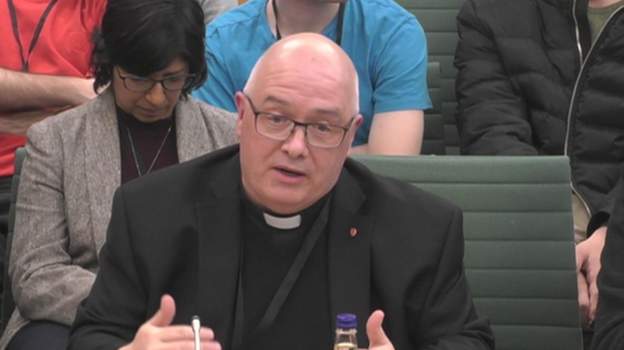LEICESTER, United Kingdom – A member of the Catholic Bishops’ Conference of England and Wales told members of the British Parliament that clergy have a “clear engagement” with those seeking baptism.
The Home Affairs select committee were listening to experts about the possibility that asylum seekers were receiving baptisms in order to stay in the United Kingdom.
Open Doors UK publishes a list of 50 countries where Christians face persecution, with the top ten being North Korea, Somalia, Libya, Eritrea, Yemen, Nigeria, Pakistan, Sudan, Iran, and Afghanistan.
However, earlier there was evidence earlier this year that 40 migrants on board the Bibby Stockholm – a vessel holding about 500 people while their asylum claims are processed – were seeking to become Christian.
Father Matthew Firth, a former Church of England priest now with the Free Church of England, told the Daily Telegraph in February that he personally witnessed 20 cases of failed asylum seekers requesting baptism during his time with the Church, and believes there are thousands more cases.
Speaking to the Home Affairs committee, Firth said “all” of the asylum seekers sought a baptism during the appeal stage.
“I think some of them are in very difficult situations and they are seeing baptism as a ticket to something whether that it’s true or not,” he said.
Father Christopher Thomas, general secretary of the Catholic Bishops’ Conference of England and Wales, was asked by a parliament member if those who receive baptism continue to participate in the Church.
“It would be incumbent on every priest to have an interview, a formal interview in many respects, with the person who is seeking baptism,” the priest said.
“In that process you would unpack their position, of where they’ve come from, if they were asylum seekers, for instance … There is a sense of real engagement,” he added.
“To say everyone who receives baptism as an adult and then continues on in the church, you can’t say whether that will happen… we are all human and people will have difference experiences of faith,” Thomas said.
The Anglican Bishop of Chelmsford, the Iranian-born Eleanor “Guli” Francis-Dehqani, told the parliament that the numbers accusing asylum seekers of false baptisms “don’t quite add up to me.”
“I have spoken to clergy who have turned people down [for baptism] because they did not feel they met the criteria,” she said, adding the Church of England clergy take baptism “very seriously.”
However, she acknowledged the Church “is not infallible.”
“We are a human institution, errors may be made,” Francis-Dehqani said.
She also said that Church decisions should not be made “on the basis of a couple of negative cases.”
“I think it is dangerous to use a couple of examples to criticise a whole system especially when it’s not the Church’s responsibility to assess the veracity of the asylum claim,” she said.
Home Office Minister Tom Pursglove told the committee that Christian conversion was “not a determinative factor” in the decision-making process, which “is weighed within the decision making, with credibility associated to that – testing of credibility amongst a range of other factors, relevant to each individual case.”
“What we are dealing with in terms of this hearing today, it strikes me as a subset of a subset,” he said. “What we are seeing is that the vast majority of individuals where Christian conversion is a factor are saying that they have converted at that initial reporting stage.”
Follow Charles Collins on X: @CharlesinRome














